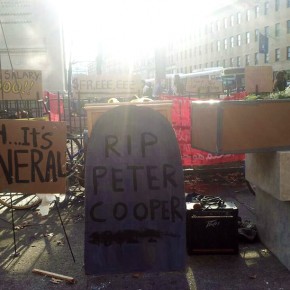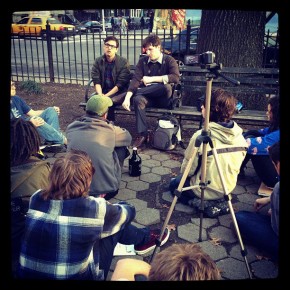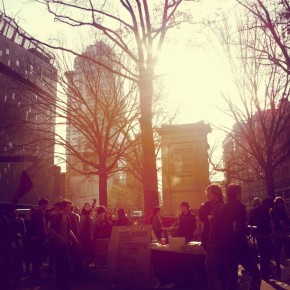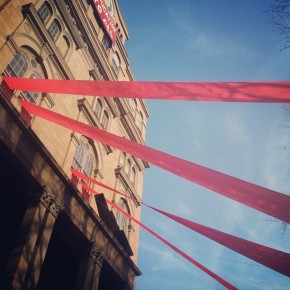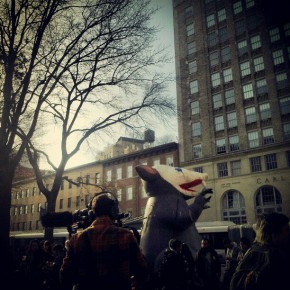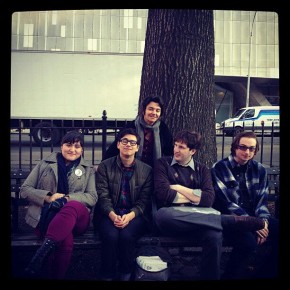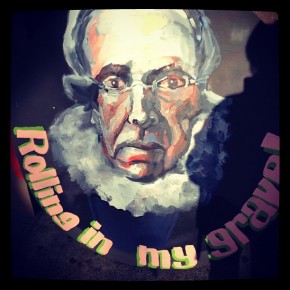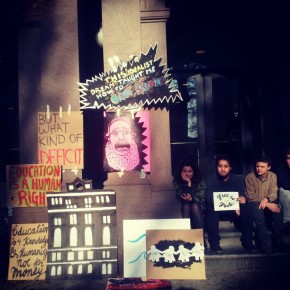A panel event held on December 6th, 2012, at New York University.
This past US election season saw an array of positions on the Left concerning the outcome that might follow from either major party’s victory. Among them, there were some who openly supported the incumbent Barack Obama as the lesser of two evils, others who opposed him by casting a vote for another candidate, and still others who followed the abstentionist line by not voting at all. Many of those who voted for “four more years” did so under the assumption that the Democrats were a broadly center-left party with vaguely social-democratic tendencies, who might be pushed to reverse neoliberal policies and stave off measures of austerity. Some, while generally less optimistic, endorsed Obama on the premise that organizing a mass movement against capitalism would be easier with the Democrats in power. Others argued that Obama had done nothing to deserve reelection, offering no hope for either change or progress moving forward. The rest, who took no stance either for or against any party, chose instead to eschew electoral politics altogether.
Now that the quadrennial plebiscite for the “leader of the free world” has resulted in a Democratic victory, we are afforded a brief chance to critically evaluate the prospects for the Left’s transition into the next four years. What is different today from four years ago, when Obama’s election seemed departure from eight years under Bush? Did the last four years signal progress or regress for the Left? How will the terrain shift for the Left with another term under the president? In terms of foreign policy, will there be an end to the wars? Or will US militarism continue unabated? Domestically, will government social programs and infrastructure deteriorate yet further? Or will legislative reforms breathe life back into the moribund welfare state? Should we, in fact, take for granted the idea that keeping Romney out of office promises a better environment in which the Left to organize? What does the future hold for a Left caught in the stale air of the status quo?
Panelists:
Ben Campbell (The North Star)
Annie Day (Revolution)
Chris Maisano (DSA, Jacobin)
Bhaskar Sunkara (Jacobin)
Moderator:
Tana Forrester (Platypus Affiliated Society)
Podiumsdiskussion mit
Stephan Lindner (attac)
Margit Rodrian-Pfennig (Uni Frankfurt)
David Salomon (Uni Siegen)
Beschreibung: Von der Finanzkrise und den Bankenrettungsschirmen zur Staatsverschuldungskrise; vom „arabischen Frühling” zu Occupy Wall Street; vom Kampf um eine progressive Europa-Politik zu den Wahlen in Griechenland und Ägypten, die doch so viel versprachen und so wenig veränderten – überall verspürt man die Notwendigkeit, über reinen „Protest“ hinauszugehen. Die Frage nach einer politischen Revolution drängt sich wieder auf. Gleichzeitig scheint das Volk – der Demos – in Anbetracht seiner politischen Machtlosigkeit resigniert zu haben, auch wenn es zur selben Zeit gegen die Korruption der Politik aufbegehrt. Während also gegenwärtig Rufe nach einer Demokratisierung des Demos laut werden, könnte dies jedoch lediglich ein Zeichen sozialer und politischer Regression sein. Dieses Problem gilt es zu erkennen und zu reflektieren.
Forderungen nach einer Demokratie „von unten“ verhallen oft im Nichts oder werden „von oben“ herab getätigt. Weder behielten die sogenannten 99% einen organisierten Charakter, noch drückten sie sich auf eine kohärente Weise in vergangenen Wahlen aus. Statt dessen teilten sie sich, wie so oft, in vielerlei Splittergruppen auf, manche davon durchaus reaktionären Typs. Demokratie verbleibt darum ein schleierhaftes Konzept: Sie nimmt nie eine ganzheitliche Form ein. Und die Menschen im Kapitalismus rufen dann abwechselnd nach „mehr“ und nach „echter“ Demokratie. Doch die Demokratie kann sein wie Janus: Mal mag sie sich durch progressive und emanzipatorische Forderungen auszeichnen – um am Ende besiegt zu werden mit der Wahl des nächsten „Bonaparte“.
Woher rührt der Ruf nach mehr Demokratie in unserer Gegenwart? Wie sieht der Einsatz der Linken für die Ermächtigung der Massen aus? Wie sieht die Zukunft „demokratischer“ Revolutionen aus, besonders im Verständnis der gegenwärtigen Linken?
In Kooperation mit dem AStA der Goethe Uni.
In Kooperation mit dem AStA der Goethe Uni.
Die Podiumsdiskussion fand statt am 06.12.2012
Please watch here.
A panel event held on December 6th, 2012, at New York University.
This past US election season saw an array of positions on the Left concerning the outcome that might follow from either major party’s victory. Among them, there were some who openly supported the incumbent Barack Obama as the lesser of two evils, others who opposed him by casting a vote for another candidate, and still others who followed the abstentionist line by not voting at all. Many of those who voted for “four more years” did so under the assumption that the Democrats were a broadly center-left party with vaguely social-democratic tendencies, who might be pushed to reverse neoliberal policies and stave off measures of austerity. Some, while generally less optimistic, endorsed Obama on the premise that organizing a mass movement against capitalism would be easier with the Democrats in power. Others argued that Obama had done nothing to deserve reelection, offering no hope for either change or progress moving forward. The rest, who took no stance either for or against any party, chose instead to eschew electoral politics altogether.
Now that the quadrennial plebiscite for the “leader of the free world” has resulted in a Democratic victory, we are afforded a brief chance to critically evaluate the prospects for the Left’s transition into the next four years. What is different today from four years ago, when Obama’s election seemed departure from eight years under Bush? Did the last four years signal progress or regress for the Left? How will the terrain shift for the Left with another term under the president? In terms of foreign policy, will there be an end to the wars? Or will US militarism continue unabated? Domestically, will government social programs and infrastructure deteriorate yet further? Or will legislative reforms breathe life back into the moribund welfare state? Should we, in fact, take for granted the idea that keeping Romney out of office promises a better environment in which the Left to organize? What does the future hold for a Left caught in the stale air of the status quo?
Panelists:
Ben Campbell (The North Star)
Annie Day (Revolution)
Chris Maisano (DSA, Jacobin)
Bhaskar Sunkara (Jacobin)
Moderator:
Tana Forrester (Platypus Affiliated Society)
Sammy Medina, Pam C. Nogales C., and Ross Wolfe gave teach-ins as part of the Free University during the Day of Action against Cooper Union's unprecedented tuition requirements. Pam did a teach-in on 19th-century American history and struggles for emancipation, while Sammy and Ross talked about the sociohistoric project of early modernist architecture.
Both teach-ins are available on our media site!
See the latest support from the faculty for a FREE Cooper Union at their UStream channel, or press play below.
Find out more on the Free Cooper Union FB page.
Sammy Medina, Pam C. Nogales C., and Ross Wolfe gave teach-ins as part of the Free University during the Day of Action against Cooper Union’s unprecedented tuition requirements. Pam did a teach-in on 19th-century American history and struggles for emancipation, while Sammy and Ross talked about the sociohistoric project of early modernist architecture.

